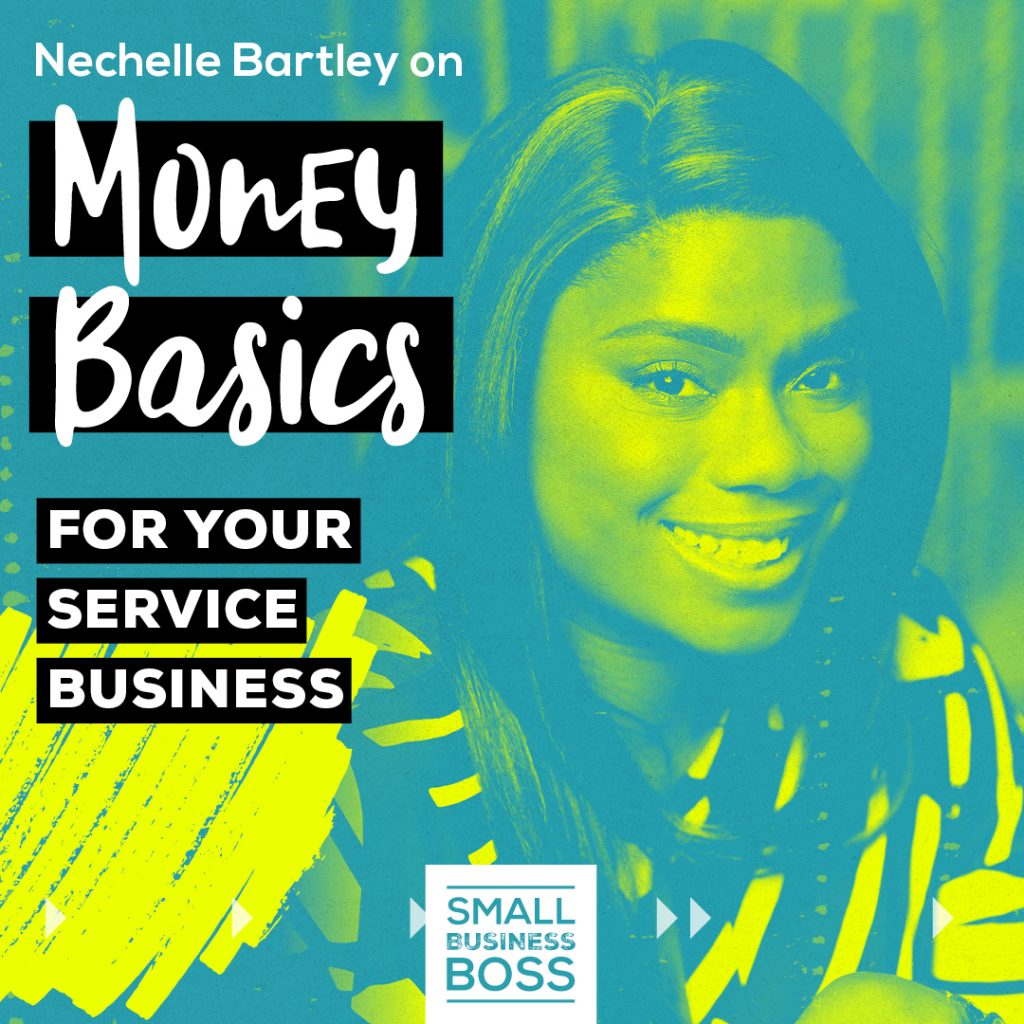
Episode 150: Nechelle Bartley on Money Basics for Your Service Business
A big part of running a business is about making and managing our money, yet there’s so much tied up in what we think and feel about money, that it’s, well, pretty tricky for a lot of us. Guest Nechelle Bartley helps us nail down some money basics and we have a very real conversation around the emotions around our money.
One of the stated missions of Small Business Boss is to help you make more money in your service business. And to be honest, there are days I feel like that lacks soul because I’ve been conditioned to have all these ideas around money.
But here’s what I’ve learned in my years in business. When we learn to make our money work for us — and how to make more of it — there’s a shift that happens within us. And as a woman and a business owner, I know exactly how powerful that is. I’ve had my fair share of money management struggles and stories over the year, and let me tell you, it’s still a work in progress.
Which is why I’m thrilled to share Nechelle and her practical, grounded approach to money basics with you today. Because the more we talk about this, the more we normalize money and remove the mystery or the stigma. The less shame and fear and anxiety we’ll all have. So let’s dive in.
Here’s what Nechelle Bartley offers as the owner of Money Basics. She’s a financial strategist to entrepreneurs and some nine-to-fivers. She helps entrepreneurs ensure that their businesses increase their net worth and provides them with a cash flow that they need to afford their vision board dreams.
Table of Contents
What’s Your Vision Board Dream?
Everyone’s vision board is so different. A lot of us struggle to figure out what ours might be.
Nechelle adds, “When I say vision board dreams, we all create a vision board, even if you don’t physically have one because we all know it’s vision board season right now. We have visions in our head of what we want our life to be, but I know, and Maggie I think you know, and everybody knows that really everything that you want, whether it’s physical or experiences, they all have a dollar attached to it. Many of us don’t necessarily attach the dollars to those things, but there are dollars associated. It’s important that we take the time to understand what those visions are and define what we want so that we can specifically know what we need to be doing from an earning perspective, and what we need to do with our money once we have it in our hands.”
Give Your Money a Job
One of the biggest challenges is that we don’t really understand what we need to be doing with our money — whether it be in our business or our personal life.
When I brought this up to Nechelle, she explained: “I use the analogy of having employees. When you hire an employee, it important that they have a job description, rules, and responsibilities that outline what they’re supposed to be doing with the time that they are within your employ. I apply the same principle to money. Most of us know this as a budget, but a lot of people don’t like that B-word, so I like to look at it from the aspect of that we know we have goals, we know we want to build wealth, we want to be able to have the cash flow, the money — whatever it is that you deem it as — to do what we want to do. If you let your money run loose, meaning you let your money come in, and it’s not very clear on what it needs to do, it’s going to start telling you what to do and cause disruption. You need to give it very specific instructions of what it needs to do.
“Everybody needs to be the CEO of their money. I think where I see some of the issues that happen for many people, whether they are an entrepreneur or even a nine-to-fiver, is the fact that (1) our money mindset causes us not necessarily to deal with it the way that we should, (2) there’s an aspect of your financial literacy. There are differences that you may not necessarily understand. (3) Not having that clear, defined vision or purpose for what you want your money to do. When these things are in a state of flux, and it’s not very clear, then we don’t necessarily make the best choices for our money. It’s important that we get those three things. I call it a trifecta of issues with money, to sort those things out, and as soon as you start to have definition and clarity around it, things start to get better.”
Financial Literacy Is a Struggle
For the audience of service business owners, freelancers, and consultants, and creatives, the struggle with financial literacy is real.
Nechelle explains: “I think the big aspect of courage and giving yourself compassion is to say that, ‘You know what? I don’t know certain things.’ Instead of feeling ashamed about it and feeling like, ‘Okay, well, I’m supposed to know. I don’t know this,’ open your mouth and say, ‘Okay, can somebody help me?’ The more that you stay in that realm of, ‘Well, I don’t know, and I just feel icky about asking,’ the more detriment you keep causing yourself. Having the courage to say, ‘No, I don’t know this,’ and to go and ask for help or even to start looking for different avenues in which you can get that information to educate yourself so you could have a better conversation about your money — period.
“I think one of the things that I feel is that we lack intimacy with our money. We don’t have a relationship with it. For many of us, we have so many different ways of what we saw, heard, and did with money when we were younger, and we’ve seen how — whether it be our parents or other people that are close to us — have managed money, so you’re seeing a lot of transactional behaviors that you may have actually picked up yourself. Also, there’s the emotional side of it because money is emotional even though it’s just a piece of paper or coins. It does have emotions attached to it because we are emotional beings. If you don’t have your own parameters around what you need your money to do, then your emotions will drive that path for you.
“I think it really does start with having compassion for yourself because we really beat ourselves up so much about how we feel about money or how we think we should be with money. Sometimes, again, it’s all depending on your journey and your walk. I say, start with compassion, and even it’s for you to brain dump the things that make you feel uncomfortable about it, just get it out of your head. I think that’s a key step. A lot of times we’re keeping things in our head, and it’s bouncing all over the place. By the time you put it on paper, you look at it and you’re like, ‘Oh, it’s not that bad.’ Right? That will allow you to see what it is. You can frame it in a way that you can understand now that it’s on paper. Approach conversations with people in bite-size pieces.
“I’ll use an analogy. Cake is my favorite saying. If I give you a whole cake to eat, you’re going to eat it. You’re going to pass out. You can only handle so much sugar. You need to slice these things very delicately, and give a little slice, and let’s have a conversation about this piece. Then keep coming back for more. You’re going to have different conversations or different cakes that you need to digest around what’s going on with your money.”
Must-Have Money Systems and Practices
Nechelle offers some insight into what you might need to get out of overwhelm when thinking about your money: “It’s about understanding your vision for what you want in your life. Have some understanding of where you’re trying to go because the money needs to follow through with that too. I think once you’re very clear on what that is, then you have the baseline to have a conversation around, ‘Okay, what do I need to do now in order to get to that point?’ I just want to stress the fact that as much as we may be going about doing vision boards and all of these particular things, it’s not going to happen tomorrow. It takes time.
“Another key thing that I want entrepreneurs to stop doing is to stop creating very random revenue goals for themselves. There’s nothing wrong with wanting to make six figures, but six figures is very large. It could be as little as a $100,000 or a dollar less than a million dollars. You’ve got to get very specific on what those things are so that you can then turn around and start to come back to your business side of your life and say, ‘Okay, this is what my business needs to be doing from an output perspective. How much do I need to be selling? How many people do I need to get in front of?’ That starts to quantify everything for you. Then, when you come over to your personal side, it gets clear. Money needs specific jobs and roles to be able to get it there so you know how to allocate your money accordingly.
“Just to take it easy on yourself. I think that’s the biggest thing that I really would like to share with everybody because we can be so hard on ourselves when we don’t hit goals, or we’re not making the money that we need to be. We need to believe that even if you are in a place where you’re not supposed to be that you will eventually get there. Understand the commitments that you’re making towards your money, and don’t let the money be the driver. Let the experience drive the goal.”
Understanding Revenue vs Profit
All the money coming into the business isn’t profit. Michelle expands on this by saying, “I want business owners to really think of profit as something separate. Profit isn’t what you pay yourself after. Your profit is supposed to be allocated for several different things. The main way that you pay yourself isn’t from whatever that’s left over. Start thinking about things differently.
“From a taxation perspective, the majority of us have heard you’re supposed to keep your business funds and your personal funds separate — and you should. What’s key is that the issue that comes up for all of us is if you had habits with money that existed in your personal finances, and you start a business, that isn’t going to disappear overnight because you started a business. Your emotions don’t know the difference between your personal finances and your business finances; it’s just going to do what it’s going to keep doing. That’s why we have to put parameters around things. Hence, separating your business money from your personal money.
“If you’re looking at the aspect of how you planned for the year and not necessarily making the emotions drive you, and it’s at the beginning of the year, you talk with your hubby: ‘These are things that we need to do this year,’ so that when you come back to your business side, you just see the amount of money that you need to pay yourself this year. That way, if everything is adjusted accordingly, you don’t necessarily have to be treating the business as, ‘Okay, I’m just going to use this money to do this on my personal side willy nilly.’ It’s planned for.”
B Is for Budget
Nechelle mentioned what she calls the B word — budget. Where do we get started with the B word if we’re totally scared of it?
“Budgets just feel very restrictive for a lot of people. It’s our inner child rebelling and saying, ‘You’re not the boss of me. I don’t want you telling me what to do.’ I think it’s just a reframe and remembering back to the aspect of, ‘You know what, Money? You have a job to do, and I’m your boss, so I’m going to tell you what to do. Here are your roles and responsibilities, go out, and get it done.’ Then completely boss your money since we don’t want our money to boss us. I think it’s just taking that ownership and then reframing it differently.”
Working on Your Money Mindset
There’s the budgeting and managing cash flow, but the money piece for most entrepreneurs is really scary. I asked Nechelle where we can get started if mindset is one of those things that we are working on, and if we’re not where probably should be.
“Start with compassion for yourself. Don’t look at it from the aspect of if something comes up and you don’t have a handle on it that it’s time to beat yourself up. Take the time to think about those things that make you feel icky about money. Really writing it out. Brain dumping it. Then when you have it in front of you, think about what you can replace it with. What is a behavior that you want to see? What is a behavior that you want to exhibit out of the that? Instead of feeling scared about this, how do I want to feel about this going forward?
“Bit by bit, day by day, start putting that into your repertoire of whatever it is that you’re doing around money because that’s the only way. It’s not about stopping everything right away; it’s about gradually replacing the way that we feel about something because it’s not going to change very quickly. It’s the daily stuff of being aware of what those are and combating with the new way of thinking, the new way of doing something.”
We all have stories that shape how we view finances, like the, “I can’t afford it,” conversation. It can take years to reframe that to: “We choose not to afford it. We choose to use our money on something else.”
Nechelle adds: “Now you know, okay, I just replace it with this instead. This is replacing the narrative. We have so many narratives — whether we are aware of it or we’re not aware of it. Just really looking at that language and questioning and asking yourself, ‘Is this true?’ No. Then why are you taking up space in my head? Why am I behaving this way? Really challenge these things when they come up. Just say, ‘Oh, no. I’m going to do it this way instead.’
“The only way to change something is to bring it to light. Don’t keep it in the dark. Talk about it. Have the courageous conversations. Talk about these things, and that’s the only way that we could eventually start seeing different perspectives and different aspects around what is going on with money that we may not have been able to figure out for ourselves.”
Summary: Three Money Basics Lessons
- Money needs a job. Every dollar in your business (or life) needs to know what it’s doing, and you’re the boss of that. Either you’re the boss, or the money will be the boss of you.
- When it comes to your revenue goals, you need to be specific. There’s no point in having goals that aren’t connected to what you really want. Are they supporting your vision? Are they serving you? If not, it will be hard to make them happen and do the work required. And it’s okay to have goals that are beyond just paying the bills.
- Mindset is everything. Money can be transactional, it can be emotional, and we need to find a way to make that work for us and remove all the shame, fear, and judgment. Like my story about “I can’t afford it,” subtle shifts and doing the work on our beliefs and values around money can make a significant difference in how we deal with our money, and we can use it as a tool in our lives.
Links for the Show:
About Nechelle:
As a Financial Strategist, Nechelle Bartley works 1:1 with professionals and entrepreneurs to make their vision boards a financial reality. She examines her clients’ mindsets, habits, and roadblocks and gets real with their current financial situation and reviews ALL of their options to develop an inside out financial strategy centered on maximizing their cash flow and decisions with their money.


